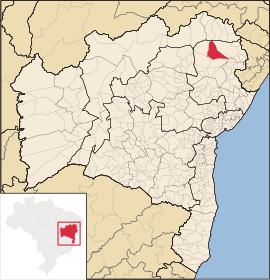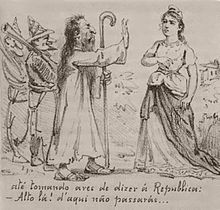Canudos
| Canudos | ||
|---|---|---|
|
Coordinates: 9 ° 58 ′ S , 39 ° 9 ′ W Canudos on the map of Bahia
|
||
| Basic data | ||
| Country |
|
|
| State |
|
|
| City foundation | 1893 and 1985 | |
| Residents | 15,732 (IBGE / 2010) | |
| Detailed data | ||
| surface | 3,189,540 | |
| Population density | 4.89 inhabitants / km 2 | |
| height | 402 m | |
| Time zone | UTC −3 | |
| City Presidency | Arcênio Almeida Gonçalves Neto ( PRB ) | |
| Location of Canudos in Bahia | ||
Canudos is now a city with an estimated 16,668 inhabitants (as of 2019) in the desert-like Sertão in the state of Bahia in northeastern Brazil .
history
Canudos became famous as a historical place from 1893 until the destruction in 1897, this place is about 20 km away from the main town of today's municipality.
A village on the Fazenda Canudos was built on the banks of the Rio Vaza-Barris as early as the 18th century . In 1893 the traveling preacher Antônio Conselheiro and his followers settled on the site and named the place Belo Monte .
Antônio Conselheiro had made himself the spokesman for a movement against the tax laws of the republic - as well as other measures such as compulsory education, the general census or civil marriage. After escaping arrest only through resistance from his supporters, he sought refuge in Canudos from the police.
The land that was not used by the owner of the fazenda and so far fallow formed the economic basis of Belo Monte. As a result, numerous landless farmers and former slaves poured into Canudos, but also traders who wanted to escape government tax pressure. Conselheiro himself lived in the strictest asceticism and forbade his followers to have any private property. To what extent this was true for the majority of the population of the place is controversial. Conselheiro organized a functioning social system; a “Catholic guard” ensured that law and order were observed. Alcohol and prostitution were forbidden; however, civil marriage was also considered the "work of the devil". Religious activities were a must.
Within two years, the place grew to 5000 houses with about 30,000 residents (information controversial). The conselheirists were perceived by the republican government as a monarchist threat and fought militarily. The place was destroyed in the war of Canudos (1896-1897), in the course of which 3 military expeditions were struck by the residents of Canudos. It was not until the 4th expedition that Canudos was captured and destroyed after an 8-month siege (March to October 1897). Antônio Conselheiro died shortly before of dysentery .
Most of the surviving residents were killed by the military or taken as slaves. The news of the government troops' victory sparked bursts of joy in southern Brazil. It wasn't until a few months later that it became known that hundreds of prisoners of war, including women and children, had their throats cut, that the mood changed and the Brazilian identity began to be defined.
Some of the survivors from Canudos settled in the Rio de Janeiro area and founded one of the first favelas there .
The events of Canudos are interpreted very differently to this day. Most contemporary authors characterized Antônio Conselheiro's movement as an outbreak of religious madness; Marxist publicists in the recent past saw it as a quasi-communist social movement.
The battle for Canudos and its bloody end has been covered by numerous South American authors. One of the first books was written by the journalist Euclides da Cunha , who himself took part as an observer in the last military expedition against Canudos. His sensational report War in the Sertão is one of the classics of Brazilian literature today. The novel The War at the End of the World by the famous Peruvian author Mario Vargas Llosa is largely based on the book by Euclides da Cunha.
The historic Canudos is now at the bottom of a reservoir. Today's Canudos is a few hundred meters higher.
literature
- Euclides da Cunha: Os Sertões. (1902)
- German: War in the Sertão . Translated by Berthold Zilly , Suhrkamp, Frankfurt am Main 2000, ISBN 3-518-39593-9 .
- Dawid Danilo Bartelt: Nation versus hinterland. The Canudos War in Brazil: a discursive event (1874–1903) , Franz Steiner Verlag, Stuttgart 2003, ISBN 3-515-08255-7 .
- Robert M. Levine: Vale of Tears. Revisiting the Canudos Massacre in Northeastern Brazil, 1893-1897 , University of California Press 1995. ISBN 0-520-20343-7 .
- Harald Stuntebeck: Canudos. A social-religious popular movement in Brazil and its pastoral impact history (= churches in world society, vol. 9). Lit, Münster 2016, ISBN 978-3-643-13021-1 .
Literary adaptations
- Mario Vargas Llosa: The war at the end of the world , Suhrkamp 1987, ISBN 978-3-518-37843-4
- The Seven Sacraments of Canudos (episode film, Brazil 1996, directors: Otto Guerra, Pola Ribeiro)
- Guerra de Canudos (film, Brazil, 1997, directed by Sergio Rezende)
Web links
- IBGE : Cidades @ Bahia: Canudos. Retrieved August 28, 2019 (Brazilian Portuguese).




